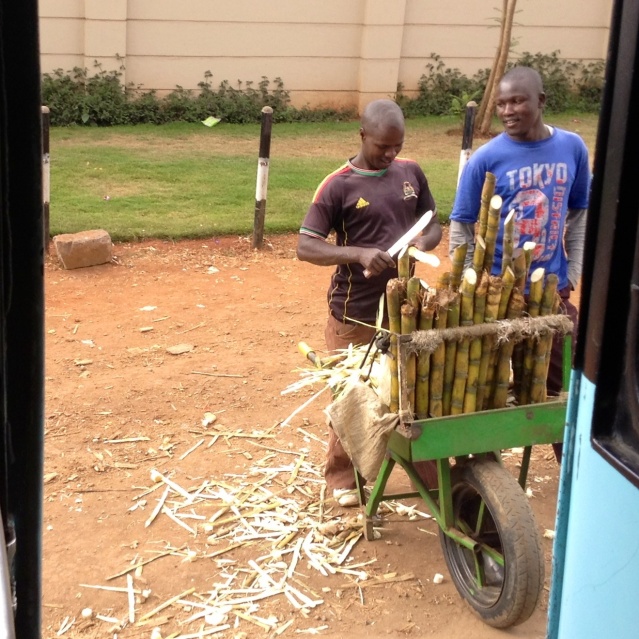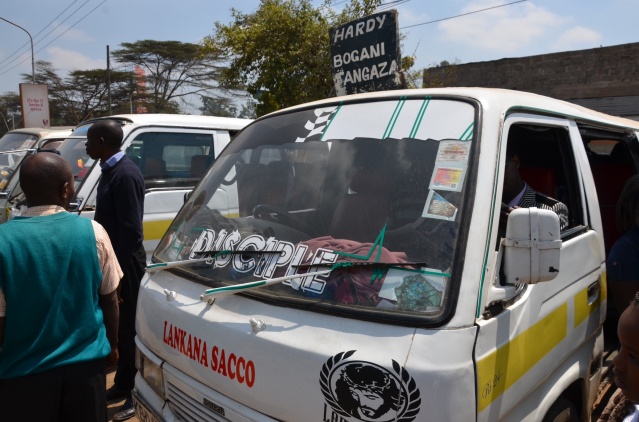If you have lived, worked in or visited Nairobi, you may know a thing or two about matatus, also known as mathrees. You may regard them with indifference, especially if you own a car and have no need to squeeze into these vehicles with the ordinary wananchi, or you may use them and fall into either of the two categories; those irritated by them or those thoroughly amused by them.
Happily, I fall into the latter group, encountering situations that tickle my funny bone every single time I hop into one to navigate the bustling capital.
These public service vehicles range from the colorfully decorated mini-buses, to mostly plain nissans and even refurbished station wagons. Devoid of any road courtesy, Nairobi’s matatus are noisy; hooting and honking all over the place, while simultaneously collecting passengers, avoiding pot-holes and overtaking other vehicles. When you are not choking on diesel fumes billowing in thick black clouds from the exhaust pipes of old, beaten down mathrees; you are clasping your handbag tight to your bosom in rabid fear of being pick-pocketed, you are enduring odd smells from folks with sweaty armpit odors wafting about and the occasional case of halitosis breathed out as if by invisible fiery dragons, and you are hoping you don’t injure your back when tossed from side to side, up and down as the matatu roughly swerves over bumps and potholes in a rush to get to the next stop.
Then there are the flamboyant matatus that play music so loud that your ears smart, the seats vibrate in unison and your heart thumps rhythmically as if dancing in your chest.
Because these vehicles are constantly in motion, you get to hone the art of jumping in and out of moving matatus, but no one does that better than the young guys peddling sweets, books, nail cutters, wallets and all manner of paraphanelia, like the sugar cane peddler who jumps into the matatu I’m in and announces, “Shillingi kumi!”
I tense up, fighting the urge to reach into my pocket for ten shillings to buy the cubed cane, then not doing so, because no one else is buying, and if no one is buying, it’s probably prudent not to buy, as you don’t know what they know, like perhaps how these edibles were washed and prepared.
There’s the time we are stuck in traffic, smack in the city centre, at the turning off from Kenyatta avenue enroute to Ambassador. A well dressed guy jumps into the matatu and begins to pontificate on books he has published, as an aid to boost kids performance in school. We engage him in conversation and ‘encouraged’ by our interest, he decides to be philanthropic, much to our surprise and doles out free samples. He urges us to purchase the 150 shillings books at Chania Bookshop. Finally, as everyone holding a book is thumbing through the pages, silently absorbed in the knowledge therein, he clears his throat and asks for support of 100 shillings for each book, which is a curious turn of events.
In the interest of gender balances, I am awestruck when I meet female conductors. With currency notes wrapped between index and middle finger, voices deep and hoarse from yelling the whole day, these ladies are fast-talkers, suave and street smart. They know the trade, count the pennies and with sharp looks are ready to snap at anyone who would dare argue back or withhold payment with the thought that these ladies, are presumably the ‘weaker sex.’ I prefer them to their male counterparts who have a tendency to grab body parts while helping unsuspecting female passengers to get on board.
Matatu routes are as unpredictable as the fares, subject to change depending on the traffic, how many passengers the vehicles will get to carry and how fast they decide to get to a destination. It’s ultimately all about more money, which makes for interesting conversations with conductors.
“Wangige beba beba!” (Wangige boarding!)
“Utapita Hurlingham?” I ask. (Will you pass Hurlingham?)
“Eeeee, kuja beba beba.” (Yes, come on board!)
You get on, and after a while of passing through unfamiliar surroundings, you remind her and she’s shocked and apologetic.
“Woi! Pole auntie! Shuka hapa, na upande ile! Hatupiti huko.” She says, pointing to another matatu in the distance. (Shocked exclamation! Sorry auntie! You can drop off here and take that matatu going to your destination. We are not passing that way!)
“Grrrr…now you tell me..” I mutter under my breath, as I jump off.
Or the matatu we board opposite ABC place, that ends up not reaching our final destination for fear of being caught up in the traffic.
“Shukeni hapa, tunazunguka! Hatuuingi jam na watu tatu !” they announce, just after passing University Way. (Alight here, we are turning back, we will not enter the jam with three people!)
“Aah, we protest, mbona hukusema hivyo mwanzoni?” (Aah, why didn’t you say that at the beginning?)
“Wacha matusi..” they reply. (Stop the insults)
We alight because we know this is a ‘no-win’ utado situation.
Or now, on the South B route
“Beba Beba, tao!” (Boarding for town)
They plead and pamper you to get you in the vehicle, then as it fills up..in characteristic cavalier fashion they spit out, “Watu wa Mombasa Road peana viti!” (Those who are alighting at Mombasa Road give up your seats to those standing!)
Or the day that South B matatus have gone on strike. I ask why..
Kuna mmoja wetu alishikwa na makarao! (One of us was arrested by the City Council cops.) I ponder on who the strike is directed at..the owners of the fleet of matatus, the City Council or the passengers? It seems like everyone is else is going about their business but we the passengers are tremendously inconvenienced.
Because the matatus on any ordinary day want to make as much as possible, there are a few drivers and conductors who will break away from the purpose of the strike and announce to people desperate to get to South-B, “Watu wa Balozi! Beba beba..!”
They inform us they will not pass the normal route but drive directly to Balozi Estate.
As a handful of people are boarding, the conductor says in a hushed but hurried voice..”Ni 100 bob, mujipange!” (It will cost 100 shillings, prepare yourselves for that.) We prepare the 100 shillings instead of the 30 shillings we ordinarily pay.
In the morning hours, as you are stuck in traffic you will be entertained by Maina Kageni on radio, discussing philandering women with disappointed partners, who have gone through the predicament with some offering the solution to walk away and pair up with a new girl, while others say that being patient worked for them and their women wisened up and came crawling home to them.
On another day, the topic thrown across to the male listeners is whether they would let their ladies pay for the date. There is a barrage of opinions with one caller piping up with, “Yes, wamama earn more than guys!”
Another caller comes up with the rebuff, “No, it does not display chivalry!”
Ultimately, whether you love or hate Nairobi matatus, you are aware that there is quite nothing like them!
Have you been to Nairobi and used a matatu to get to your destination? What was your experience like?
Categories: Kenya









I’ve never been to Nairobi but perhaps one day. I have however, been on this type of vehicle as they abound in pretty much every developing country.
It’s fascinating people-watching but the squashiness in India, the animals in Vietnam, the plastic bags in Poland, the staring (everywhere) and the heads on my knee can get a little exhausting LOL!
LikeLiked by 1 person
haha..love the way you’ve put it. I reckon in every region of the developing world, the transport system gives one a closer look at the culture of the inhabitants there. I look forward to heading to Tanzania and reporting on the public vehicles there..I’ve heard that they are very courteous as compared to what we experience in Kenya..:-) and you are welcome to add Kenya to the list of countries you’ve been to, would love to read on your views if you do visit.
LikeLike
I’ve only ridden in one of those once in Nigeria, a long time ago. They are quite the common sight all over the place, and l chuckled reading this. Good to know they are the same the world over 🙂 .
LikeLiked by 1 person
Yes they are! If you’re not amused by their antics, you’ll find them annoying!
LikeLike
This is my daily hustle. Always a new story with each Matatu ride. Love the photos on this post and the writing truly captured the reality of our Matts.
LikeLiked by 1 person
Hey Diana, happy that you liked the story..greatly honored! Missing the mathrees already, looking forward to my next visit.
LikeLike
Fascinated by your way of writing. Certainly lights up the imagination of the reader . For a moment , I was there with you in Kenya.
LikeLike
Thank you Leon..that’s what I hope for, to bring these destinations to life.
LikeLike
Hah! You placed me right into Nairobi – I could almost see someone waving at me madly trying to get me on board! The best seat? Next to the driver, with a backpack blocking your view. That way you’ll never know about oncoming traffic!! 😉 Wonderful piece, thank you!
LikeLiked by 1 person
haha …glad you liked it Leyla! I think you are due for a return visit huh?
LikeLike
I may just become a regular on this blog. Found you from Bikozulu.
LikeLike
You are welcome Kyengo “CK”!
LikeLike
Matatus is one experience any visitor to Nairobi should experience. Nice read.
LikeLike
I love matatus!
LikeLike